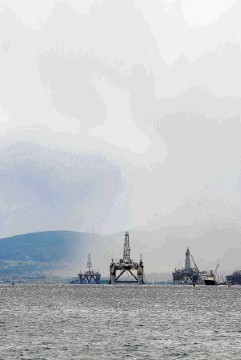
A fresh political row has erupted over the role of North Sea oil and gas in an independent Scotland after the revenues forecast for the next 30 years were halved.
The Office for Budget Responsibility (OBR) slashed its prediction for offshore receipts in 2040 to 0.05% of UK GDP.
Chief Treasury Secretary Danny Alexander used the report to claim it was “sorely mistaken” to base any plans for independence on a “declining source of income”.
A spokesman for First Minister Alex Salmond branded remarks by UK ministers as “the same old scaremongering” – and emphasised that £1.5trillion of North Sea oil and gas remained.
Economist Professor Alex Kemp told the Press and Journal last night that the OBR’s forecast could prove a “bit pessimistic”.
The independent watchdog predicted oil prices would rise from £61 ($95) a barrel in 2016 to £112 ($173) in 2040, down from its forecast last year of a rise from £69 ($107) in 2015 to £133 ($206) in 2040.
“Our latest projections suggest oil and gas revenues falling to around half the level we projected last year by 2040-41, but the reduction is small as a share of GDP – from 0.1 to 0.05%,” the report said.
It added that production would stop at many fields in the 2020s and then tax relief for decommissioning, secured in this year’s Budget, would kick in and push down revenues.
The report triggered a war of words over Scotland’s future yesterday.
Scottish Secretary Michael Moore said: “We know it is a volatile commodity. That risk is far better handled as part of the wider UK, where oil revenues represent a much smaller part of the economy than they would in a separate Scotland.”
A spokesman for Mr Salmond said: “This is just the same old scaremongering from Michael Moore which avoids the reality of how successive Westminster governments making decisions about North Sea oil have created fiscal instability for the industry.”
Professor Kemp, from Aberdeen University, believed the OBR did not properly take account of the current upsurge in North Sea investment.
“The North Sea is doing very well at the moment, there is a lot of new investment,” he said. “I am not sure the OBR has factored in what we have found in our modelling – the fruits of this investment.
“In the short term it means tax revenues will be reduced because they have got more allowances which reduces the amount they have to pay.
“But in the longer term we are finding that the effect of all the investment now will be that the tax revenues in the long term will be rather higher than might otherwise have been anticipated.”